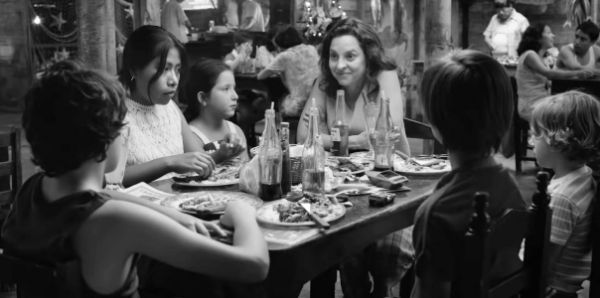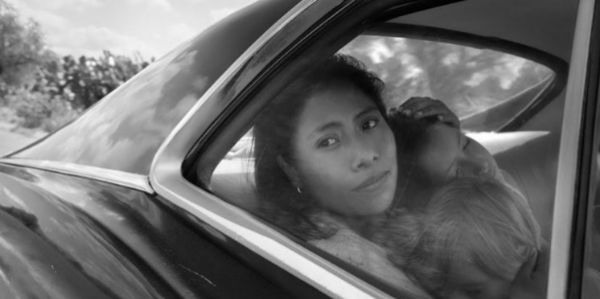Film Fest 919 Review: ROMA: Cuarón Crafts An Overwhelming Audio-Visual Experience

I'm a student at the University of North Carolina at…
I don’t want to be “that guy,” but it’s almost impossible for me to imagine not seeing Alfonso Cuarón’s Roma on the big screen. Now, this is not intended as a judgment on Netflix. I’m eternally grateful for any studio willing to bankroll risky projects in this day and age. At the same time, I genuinely cannot overstate the sensory power of seeing Roma in a proper theater.
It’s a feast for the eyes and ears, an audio-visual cornucopia best described as totally overpowering. From the crashing of waves to the vibrancy of a busy Mexico City square, Cuarón’s deeply personal portrait of his childhood in the 1970s is a film that you experience. In a captivating, terrifying riot sequence, gunshots haven’t sounded so real since Dunkirk.
Roma is a film that improves with each passing minute; the longer it lingers in your mind, the more of an impact it will have. In the heat of the moment, I must admit I occasionally felt restless and underwhelmed. Yet even in those moments of silent contemplation and repetitive normalcy, Cuarón taps into something moving, touching, and totally transfixing. You can’t escape the feeling that Roma is a monument of cinematic prowess and historical poignancy.
Detailed Tapestry Of Mexico City In 1970
The film begins with water rushing down the screen. The water splashes repeatedly; sometimes it’s sudden and harsh, sometimes it’s soft and smooth. These makeshift waves are coming from Cleo (Yalitza Aparicio), a domestic worker who spends her days mopping the floors and cleaning the home of a well-off family in Mexico City. The matriarch of the family is Sofia (Marina de Tavira), whose marriage to Antonio (Fernando Grediaga), an intelligent medical doctor, is crumbling.

Their children, however, are not really aware of what’s happening. The kids seemingly adore their father, who is treated as an idea more than a character. When Antonio leaves the family for good, Sofia tells them their father is on a business trip in Canada. What’s the use of maintaining this lie? One can never be sure, but it keeps the children innocent for now.
With these domestic struggles privy to only Cleo and Sofia, the film becomes an expansive portrait of various experiences in this crucial time. Cleo begins to explore sex and dating life, growing close with a young man (Jorge Antonio Guerrero) who spends his days studying martial arts. When she becomes pregnant, the young worker is forced to reckon with how her job might be in jeopardy. And as the violence of a dangerous era increases its presence, the family must come to terms with the fact that nothing will ever be the same again.
Autobiographical Expansion Of Cuarón’s Major Themes
There’s something sincerely enigmatic about the way Roma plays out. Going in, I imagine most viewers will know they’re far from the realm of conventional filmmaking. Still, I found myself questioning the film’s overarching goal. Whose story is this? Why choose these moments? It all comes together, but I think the film is best understood by what’s going on below the surface.
Cuarón disregards many narrative tropes, opting for tender moments and sweeping sequences over explicitly dramatized tension. Eventually, it becomes obvious that the filmmaker’s first film since Gravity (and his return to Spanish-language cinema after many years in the Hollywood system) is a new, more obviously personal view of the themes he’s been exploring several years now.

I definitely don’t want this to become an auterist deconstruction of the Oscar heavyweight, but there’s so much here that feels intensely connected to the director’s broader body of work. Once again, Cuarón is fascinated by the soothing (and uncontrollably violent) power of water, specifically its ability to move us forward in time, to wash away one cycle and begin another. He focuses on childbirth, the miracle of life that ensures our transition from one generation to the next (we saw this in Gravity and more prominently in Children of Men). And in conjunction with those cycles and generational shifts, Cuarón subtly includes a spiritual angle of rebirth and rejuvenation, the idea that we’re living one of many lives.
If this story often feels thin and meandering, it’s clear that Cuarón is working primarily on a subtextual level. Roma is awash in symbolic interpretations and meditative power, more about important relationships and transformative moments than traditional dynamics. That’s not to say the film is some kind of avant-garde work of disconnected storytelling; it’s just operating on its own frequency.
Brilliant Filmmaking Highlights Personal Experience
However, the striking qualities of Roma‘s thematic prowess don’t necessarily overcome its issues of framing and point-of-view. Since its announcement, the film has been positioned as an autobiographical painting of a very specific time and place, based almost exclusively on Cuarón‘s own experiences and memories. And some of the most memorable sequences of the film seem to position crucial moments from the POV of the children. One scene finds Antonio pulling the car into the family’s shockingly narrow garage, which comes off like a sort of awe-inspiring nightly ritual for the kids.
But this isn’t really their story. They exist on the periphery of the narrative, guarded from information that might damage their innocent souls. Of course, Cleo and Sofia are undeniably fascinating characters played with sensitivity by Yalitza Aparicio and Marina de Tavira, respectively. The former seems to have reached spiritual transcendence amid cultural and personal strife, while the latter’s struggle with her collapsing marriage is genuinely devastating. Still, I can’t quite understand why Cuarón himself has so little presence here. The film is working an epic canvas, so the rationale for a limit in POV feels shoddy. It may be autobiographical, but it doesn’t necessarily feel like it.

Yet even as difficulties emerge in relation to questions of personal experience and perspective, Roma is, above all else, an immersive cinematic experience. Shot by Cuarón himself (continuing a recent trend of directors working as their own cinematographers), the film is rich and luxurious, a gorgeous assortment of photogenic frames and iconic images. The filmmaker’s touch with the camera is never to be underestimated, capturing a fluid balance of the extraordinary and the mundane.
Surprisingly enough, these beautifully rendered moments of horror and beauty aren’t even the top reason to seek out Roma in a theater. No, that honor belongs to its spectacular, you-are-there sound design, which engulfs the viewer in a sea of sensory chaos. From the hustle and bustle of a busy street corner to the crackling intensity of a forest fire, Cuarón has created a film that holds a special kind of experiential magic. In a terrifying scene near the film’s conclusion, Cleo (who can’t swim) dashes into the crashing waves of the ocean to save two of the children from drowning. Let me tell you, I felt each of those waves hit me deep inside my core. It’s remarkable.
Roma: Conclusion
Amusingly enough, I’m in something of an odd position with Roma. As I spoke with critics and friends after the movie, everyone seemed to be ecstatic, thrilled beyond belief, etc. Despite my enthusiastic response, I couldn’t quite reach that level of excitement.
And yet, I responded to the film’s emotional beats. I found much to appreciate under the surface. I was awed by Cuarón‘s technical wizardry. Even my nitpicks about perspective feel small. Theoretically, I should have been as overjoyed as everyone else. So why can’t I match this level of passion?
Short answer: I don’t know. But I look forward to returning to Roma once more, as I’m positive I’ll find even more to appreciate. I only regret that my second viewing won’t take place in a theater, where the towering images and visceral sounds fully mesmerize the senses.
If you can, make the journey to the cinema. It’s worth it.
Are you looking forward to Roma? What is your favorite Alfonso Cuarón film? Let us know in the comments below!
Roma screened on October 3, 5, and 6 at Film Fest 919 in Chapel Hill, North Carolina. The film will be released worldwide on Netflix and in select theaters in December.
https://www.youtube.com/watch?v=fp_i7cnOgbQDoes content like this matter to you?
Become a Member and support film journalism. Unlock access to all of Film Inquiry`s great articles. Join a community of like-minded readers who are passionate about cinema - get access to our private members Network, give back to independent filmmakers, and more.
I'm a student at the University of North Carolina at Chapel Hill. For 8 years, I've edited the blog Martin on Movies. This is where I review new releases, cover new trailers, and discuss important news in the entertainment industry. Some of my favorite movies- Casablanca, Inception, Singin' in the Rain, 2001: A Space Odyssey, The Wolf of Wall Street, The Nice Guys, La La Land, Airplane!, Skyfall, Raiders of the Lost Ark. You can find my other reviews and articles at Martin on Movies (http://martinonmovies.blogspot.com/).













